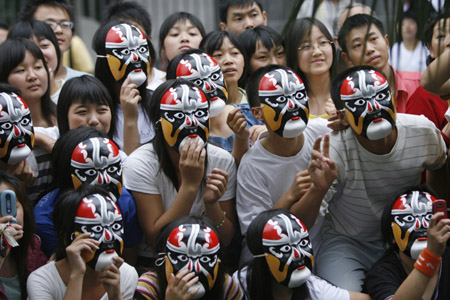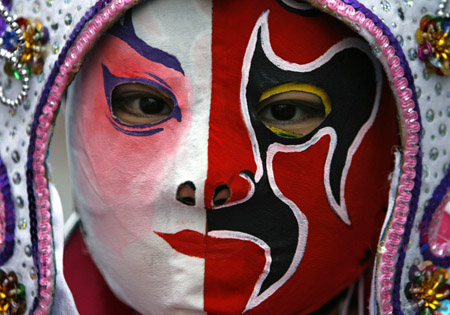| Tools: Save | Print | E-mail | Most Read |
| Cultural Festival Draws Crowds of Spectators |
| Adjust font size: |
A
A
People, wearing
A performer wears a Ran Fan, a 61-year-old pensioner from Dujiangyan, got up at 5AM Wednesday morning to take a bus to "I learned from the media about two weeks ago that the opening ceremony will be followed by a parade of singers and dancers from different parts of the country," said Ran, a former high school art teacher. He was one of some 10,000 spectators who participated in Wednesday morning's parade held along Following the speeches by local and regional officials praising the achievements made by The deafening sound from gong and drum beating drew applause and yelling from excited spectators. Hailed as the best in the country, the Imposing Gong and Drum from Singers and dancers from Romania, South Korea, Russia, Africa, Brazil and Mexico, followed, along with performances from the Tibetan and Qiang ethnic groups of China, acrobats from eastern China's Jiangsu Province, Shaolin Buddhist monks demonstrated martial arts, and Sichuan opera performers breathing fire and dragon dance performers from Sichuan debuted in procession. "Both their performances and traditional costumes were marvelous and wonderful to see," commented Ran. "I knew many sites on the World Heritage List, but I did not know what the intangible cultural heritage was. I learned a lot about it from the parade," Ran said. Many spectators mistook all the performers for professionals because of their wonderful performances. But Qiang Ba, a middle-aged Tibetan who led a group of dancers from The performances not only drew locals like Ran but also Tang Rongmei, a 67-year-old American professor teaching in the Tang, an educator who graduated from Tang, who visited the "To me, the Shaolin martial arts show what life should be - energetic and concentrated," she said. "None of my students knew about the opening ceremony or the parade before I told them the day before. But they were all were excited to see the performances and kept taking pictures," Tang explained. "One said that she had never seen anything so grand in her life." The 19-day International Festival of the Intangible Cultural Heritage, approved by the State Council, sponsored by the Ministry of Culture and Sichuan Provincial Government, and organized by the Chengdu Municipal Government, the Sichuan Provincial Department of Culture and the China National Center of Intangible Cultural Heritage Protection, is aimed at furthering China's efforts in protecting its intangible cultural heritage and enhancing its global influence in the field, said Ding Wei, Assistant to the Minister of Culture. The reason why " According to Deng Gongli, deputy secretary-general of the Chengdu Municipal Government, a total of 32 groups of singers and dancers from Europe, Africa, Wednesday's parade was the May 23 also marked the formal opening of the Exposition of the International Festival of the Intangible Cultural Heritage in the With 80 halls, the Exposition will display more than 1,000 domestic and overseas intangible cultural heritage items from May 23 to June 10 with free admission. Deng said that folk artisans will display their work. Muqam, a traditional performance of the Xinjiang Uygur Autonomous Region, can be seen in the Exposition. Combining music, dance, singing and poetry, Muqam is on the List of the Oral and Intangible Cultural Heritage of the United Nations Educational, Scientific and Cultural Organization. "It will be the first time that Muqam makes its debut outside of Xinjiang," said Zhu Shuxi, chief of the Chengdu Municipal Bureau of Culture. He added that the famous Xiaoxiang Lion Dance would also be performed in the Exposition. The dance, which has its origins in Nearly 70 performers will show their stunts of climbing to the top of poles more than 10 meters high while dressed and dancing like lions. Opera lovers will also have the rare opportunity to appreciate the Chuankun Opera in the Auditorium of the Performers from With a history of 600 years, the Kunqu Opera, which is on the UNESCO's List of Oral and Intangible Cultural Heritage List, is referred to as the "ancestor of all operas" in Sichuan Opera was developed during the Qing Dynasty (1644-1911), based on five local operas including the Kunqu Opera. The Chuankun Opera is a branch of the Kunqu Opera in (
|
| Tools: Save | Print | E-mail | Most Read |
 |
| Related Stories |
|
Product Directory China Search |
Country Search Hot Buys |



